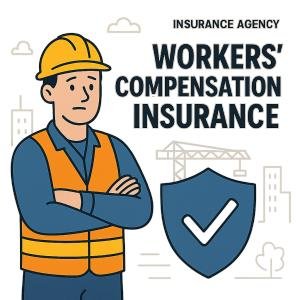
Bundling Liability and Workers’ Comp for Security Guard Firms: Savings or Trouble?
August 12, 2025
Workers’ Comp Renewal Checklist for Nursing Homes: 30-Day Countdown
August 12, 2025Navigating the complexities of securing workers’ compensation insurance is a critical step for any security guard company operating in Georgia. This essential coverage not only ensures compliance with state regulations but also provides financial protection for both employers and employees in the event of workplace injuries. Understanding the unique risks faced by security personnel, as well as the specific requirements set forth by Georgia law, is key to acquiring the right policy.This article will guide you through the process of purchasing workers’ comp insurance tailored to your Georgia-based security guard company, outlining the necessary considerations, legal obligations, and best practices to safeguard your business and workforce effectively.
Table of Contents
- Understanding Georgia Workers’ Compensation Requirements for Security Guard Companies
- Assessing Your Security Guard company’s Risk Factors to Determine Coverage Needs
- Choosing the Right Insurance Provider Specializing in Workers’ Compensation for Security Services
- Best Practices for Managing Premium Costs and Claims for Your Georgia Security Guard Business
- Q&A
- Wrapping Up
Understanding Georgia Workers’ Compensation Requirements for Security Guard Companies
security guard companies operating in Georgia must adhere to specific workers’ compensation laws to ensure the safety and well-being of their employees. Under Georgia law, businesses with three or more employees are required to carry workers’ compensation insurance, making it mandatory for most security guard firms. This coverage protects your guards from medical expenses and lost wages resulting from workplace injuries. Failure to comply not only exposes your company to hefty fines but can also lead to lawsuits and the loss of your business license.To stay compliant, it’s importent to understand the classifications and risk factors unique to security services, such as exposure to physical harm and long hours on the field.
Key requirements for security guard companies in Georgia include:
- Registering your workers’ comp insurance policy with the Georgia State Board of Workers’ Compensation.
- Accurately classifying your employees based on job duties to determine correct premium rates.
- Maintaining up-to-date records of any workplace injuries and immediate reporting to your insurer.
- Regularly reviewing your policy terms to account for changes in workforce size or operational risks.
keeping these requirements in check will streamline your insurance process and minimize potential legal complications. Knowledge of Georgia’s workers’ compensation statutes empowers security companies to build robust protection plans for their staff while maintaining operational integrity.
Assessing Your Security Guard Company’s Risk Factors to Determine Coverage Needs
Before securing workers’ compensation insurance, it is essential to conduct a thorough evaluation of the unique risks associated with your security guard company. start by categorizing the typical job roles within your organization-whether it’s patrolling,monitoring,or managing security systems.Each role carries distinct hazards, from physical altercations to repetitive strain injuries. Identifying these specific risk factors allows you to tailor coverage limits that adequately protect your workforce without incurring needless costs.
Consider the following key variables when determining your coverage needs:
- Employee Classification: Different roles have varying risk levels; properly classifying employees impacts premium calculations.
- Incident History: Reviewing past workplace injuries can highlight vulnerable areas requiring enhanced protection.
- Operational Habitat: High-risk locations demand higher coverage limits than administrative positions.
- Regulatory Compliance: Ensure adherence to Georgia’s specific workers’ comp laws and coverage mandates.
| Risk Factor | Impact on Coverage | Recommended action |
|---|---|---|
| Physical Confrontations | High frequency of injury claims | Increase coverage limits & add assault coverage riders |
| long Shifts | Heightened fatigue-related incidents | Implement scheduled breaks; consider fatigue risk endorsements |
| Technology Monitoring | Lower physical risk but potential ergonomic issues | Include occupational disease coverage |
Choosing the Right Insurance Provider Specializing in workers’ Compensation for Security Services
When selecting an insurance provider for workers’ compensation, it is essential to prioritize those with extensive experience in security services. Providers familiar with the unique risks faced by security personnel can offer tailored coverage that not only complies with Georgia state regulations but also addresses industry-specific liabilities. A specialized insurer will efficiently manage claims related to on-the-job injuries, minimizing operational disruptions while safeguarding your workforce.
Consider these key factors when evaluating insurance partners:
- Industry expertise: Verify their track record working with security guard companies.
- Customizable policies: Look for flexible coverage options that fit different security roles.
- Claims support: Ensure they provide responsive and clear claims handling.
- Competitive premiums: Balance affordability with thorough protection.
| Provider Attribute | benefit for Security Services |
|---|---|
| Risk Assessment | Identifies high-risk tasks and adjusts coverage accordingly. |
| Legal Compliance | Ensures adherence to Georgia’s workers’ comp laws. |
| Dedicated Support Team | Offers faster resolution of claims and inquiries. |
| Value-Added Services | Includes safety training and injury prevention resources. |
Best Practices for Managing Premium Costs and Claims for Your Georgia Security guard Business
Effectively managing premium costs and claims is critical for the financial health of your Georgia security guard firm. To achieve this, consider implementing risk mitigation strategies such as comprehensive employee training programs, routine safety audits, and clear incident reporting protocols. These measures not only reduce workplace injuries but also demonstrate to insurers your commitment to safety, which can translate into lower premium rates. Additionally, analyse your payroll categorization diligently to ensure each job classification is accurately reflected - mistakes here can lead to inflated premiums or denied claims.
Another key practice is maintaining open communication with your insurance provider. Regularly review claim histories and premium adjustments to identify any discrepancies or trends. use the following checklist to stay on top of your workers’ comp management:
- Review policy coverage annually and adjust for workforce changes
- Document all incidents promptly to avoid claim disputes
- Engage with a reliable insurance broker specializing in security guard businesses
- Utilize experience modification ratings to negotiate better premium terms
- Implement return-to-work programs to reduce claim duration
| strategy | Impact on Premiums | Claim Reduction |
|---|---|---|
| Safety Training | High | Important |
| Correct Payroll Classification | Moderate | Moderate |
| Experience Rating Monitoring | Moderate | High |
| Return-to-Work Programs | Low | High |
Q&A
Q&A: How to Buy Workers’ Comp Insurance for Your Georgia Security Guard Company
Q1: Why is workers’ compensation insurance important for a security guard company in georgia?
A1: Workers’ compensation insurance provides critical coverage for medical expenses and lost wages if an employee is injured or becomes ill on the job.For security guard companies in Georgia, which often involve physical risk, this insurance protects both the employee and the business from perhaps costly claims and legal liabilities.
Q2: Is workers’ compensation insurance mandatory for security guard companies in Georgia?
A2: Yes. Georgia law requires all employers with three or more employees to carry workers’ compensation insurance. Even if your security guard company has fewer employees,securing this coverage is highly recommended to safeguard your workforce and your company’s financial health.
Q3: How do I determine the right amount of workers’ comp coverage for my security guard business?
A3: The required coverage depends on the number of employees and the nature of their job duties. Security guards typically face moderate to high risk, so it is indeed essential to evaluate payroll size, job classifications, and potential hazards. Consulting with an insurance professional can definitely help tailor an appropriate coverage plan that meets legal requirements and business needs.
Q4: Where can I purchase workers’ compensation insurance in Georgia?
A4: Coverage can be obtained from private insurance carriers authorized to operate in Georgia, through the state’s Workers’ Compensation Assigned Risk Plan if your business has difficulty securing coverage, or via group insurance pools. Working with an experienced insurance agent specializing in workers’ comp for security firms helps streamline the process.
Q5: What documentation is needed to apply for workers’ comp insurance for my security company?
A5: You will typically need to provide your company’s federal employer identification number (FEIN),detailed payroll information,employee job classifications,a description of your business operations,and any prior workers’ compensation claims history.
Q6: How do premiums for workers’ compensation insurance get calculated for security guard companies in Georgia?
A6: Premiums are calculated based on several factors,including total payroll,job risk classification,the company’s claims history,and the level of coverage selected. Security guard roles frequently enough fall into a moderate to high-risk category,which can affect premium costs.
Q7: Are there ways to reduce workers’ compensation insurance premiums for a security guard business?
A7: Yes.Implementing robust safety training programs, maintaining a clean claims history, properly classifying employees, and working with insurers offering tailored programs for security firms can all help lower premiums.
Q8: What steps should I take after purchasing workers’ comp insurance to stay compliant?
A8: ensure all employees are properly covered, display the required workers’ comp posters at your business location, report any workplace injuries promptly to your insurance carrier, and keep accurate records. Periodically review your policy to adjust coverage as your business grows.
Q9: Can subcontractors or self-reliant contractors be covered under my workers’ compensation policy?
A9: generally, independent contractors are not covered under your workers’ comp policy unless they are specifically included. It is indeed crucial to classify workers correctly and consult with your insurer about coverage options for subcontractors.
Q10: Where can I find more resources or assistance regarding workers’ comp insurance in Georgia?
A10: The Georgia State Board of Workers’ Compensation offers resources and regulatory guidance. Additionally, professional insurance agents and brokers experienced in workers’ compensation for security guard companies can provide personalized advice and support.
Wrapping Up
securing the right workers’ compensation insurance is a critical step in protecting your Georgia security guard company from potential financial liabilities and ensuring compliance with state regulations. By thoroughly assessing your business needs, understanding Georgia’s specific requirements, and partnering with a reputable insurance provider, you can safeguard your employees and your company’s future. Taking the time to research and invest in comprehensive coverage not only supports your workforce but also strengthens your business’s reputation and operational stability in the competitive security industry.
“This content was generated with the assistance of artificial intelligence. While we strive for accuracy, AI-generated content may not always reflect the most current information or professional advice. Users are encouraged to independently verify critical information and, where appropriate, consult with qualified professionals, lawyers, state statutes and regulations & NCCI rules & manuals before making decisions based on this content.






